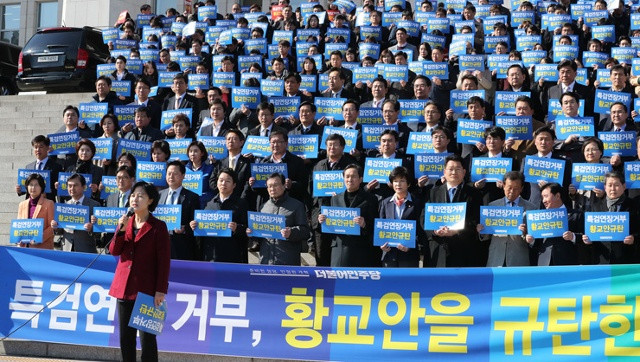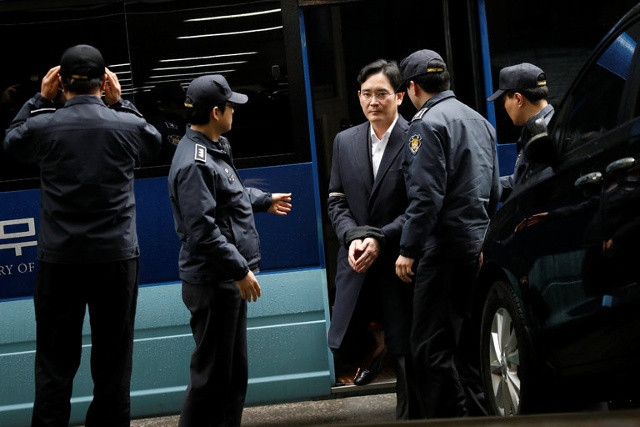Political and economic 'storm' in South Korea
(Baonghean) - South Korean President Park Geun-hye has been impeached as a corruption suspect, and the Vice President of Samsung - the group that plays the "backbone" role of the South Korean economy - has been indicted on multiple charges. All these developments have forced South Korea to face a "storm" in both politics and the economy.
What future for female President?
President Park Geun-hye did not attend the final hearing of her impeachment on February 28. One of her lawyers read out her statement to the court, in which the president once again apologized for “causing great pain to the people” and hindering many issues on the agenda. But she also denied all charges in the scandal involving her longtime friend Choi Soon-sil.
 |
| South Korea's opposition Democratic Party calls for the impeachment of acting President Hwang Kyo-ahn. Photo Yonhap |
Legally, prosecutors determined that Ms. Park colluded with her longtime friend, Ms. Choi Soon-sil, to receive bribes from Samsung Group – South Korea's largest economic conglomerate – in exchange for preferential treatment for her operations.
This means that Ms. Park has been identified as a corruption suspect! However, under Korean law, Ms. Park Geun-hye will not immediately face the above charges thanks to the provisions of immunity from prosecution for the incumbent President.
However, if the Constitutional Court upholds the impeachment decision, Park will be stripped of her immunity from prosecution and immediately suspended from office. It is expected that March 13 will be the “fateful” day when the Constitutional Court of Korea will announce its final verdict to see whether President Park will be impeached as proposed by the National Assembly.
It should be noted that in order for the impeachment to be approved, at least six of the nine judges on the Constitutional Court must support the National Assembly's decision. One of the nine judges finished his term on the court on January 31. Another, Chief Justice Lee Jung-mi, will retire on March 13. And appointing a new judge is unlikely given the current political crisis. The number of judges has been reduced, but the impeachment still requires six votes - which is considered favorable to Ms. Park.
Furthermore, according to experts, the current Court is considered quite conservative, often siding with the Government in major events during the President's term, so the chance for Ms. Park not to be impeached is still possible. However, the "way out" for her is still very narrow when Ms. Park has just been accused of corruption and the wave against her is still spreading in Korea.
A survey found that 74% of respondents want the Constitutional Court of South Korea to soon conclude and issue a ruling allowing the National Assembly to impeach Ms. Park. It is unclear where the future of the female President of the Kimchi country will go and the final conclusion will only be available after March 13.
Unpredictable crisis
South Korean politics is increasingly showing cracks and tensions that are difficult to resolve. The conclusion of the investigation on February 28 into the scandal surrounding impeached President Park Geun-hye has angered the country's opposition parties. Ms. Park's corruption allegations have not satisfied the opposition parties.
They demanded the impeachment of Acting President and Prime Minister Hwang Kyo-ahn for his decision not to extend the investigation into the scandal. At the same time, the opposition parties also decided to ask National Assembly Speaker Chung Sye-kyun to exercise his right to directly hold a vote on a bill that would allow an extension of the investigation into the scandal involving Ms. Park.
According to the South Korean Constitution, impeachment of the Prime Minister requires at least one-third of the National Assembly members to propose it and at least 50% of the votes to approve it. Meanwhile, opposition parties hold 166 seats in the 300-seat National Assembly, so many observers believe they will have no difficulty securing the minimum number of votes to impeach Prime Minister Hwang.
In addition, to achieve their goals, in the coming time, it is likely that the opposition parties will conduct lobbying to convince more support from other parliamentarians in the National Assembly. This is a sign that the political crisis in this country is having more unpredictable developments.
The economy is also "holding its breath"
While the political scene is in turmoil, the Korean economy is also in turmoil. Samsung, the largest economic group in Korea, which plays a key role in the economy, is also "involved" in a major scandal involving President Park.
Last month, Samsung Group Vice Chairman Lee Jae-yong, the group’s future heir, was arrested, raising concerns. Mergers, acquisitions and personnel decisions were immediately “frozen”.
 |
| Samsung Vice Chairman Lee Jae-yong was indicted for bribery. Photo Reuters |
In a recent trial, Mr. Lee and four other Samsung executives were formally indicted on multiple charges. Among many charges, Mr. Lee was accused of paying more than $40 million in bribes to Ms. Choi Soon Sil - a close friend of President Park - in exchange for loan guarantees.
The indictment of Mr. Lee is another blow to the Suwon-based electronics giant as it tries to regain its footing after the Note 7 smartphone fiasco last year. The turmoil has also forced the group to disband its Corporate Strategy Office, the top decision-making body that was involved in the corruption investigation, potentially hampering the South Korean giant’s ability to make business decisions.
Some say the fallout will continue for another year or two, stalling many of Samsung’s new deals and investments, reducing the group’s ability to compete internationally. That will also have an impact on the entire Korean economy.
Thanh Huyen
| RELATED NEWS |
|---|
